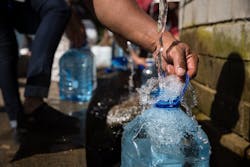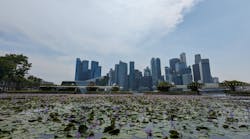Milena Yordanova is MarCom manager at Dupont Water Solutions. Yordanova can be reached at [email protected].
Access to clean water is essential for life. But in South Africa, there are communities still facing considerable water access challenges. There are many reasons for this growing water crisis including rapid population growth and climate change, and a fundamental shift in mindset is needed if we are to change the trajectory from water scarcity to security.
More than 3 million people in South Africa still lack access to basic water supplies and only 64% of the population have a supply that would be deemed reliable. Considering the UN recognizes access to clean, affordable water as a basic human right, action is urgently needed to ensure these communities are provided with sustainable supplies.
As a large and geographically diverse water-scarce country, South Africa faces varying degrees of problems with myriad causes, meaning there is no universal solution. From failing aging water infrastructure to droughts and other climate change-related issues, these supply-side problems are further complicated by the country’s impressive economic development which brings increased pollution and population growth. The National Water and Sanitation Master Plan makes clear that without tens of billions of dollars of investment in water infrastructure, the country will run out of water by 2030.
Now that we understand the scale of the problem, how can South Africa avoid a water crisis?
Advanced technologies and innovative approaches to water management present opportunities for us to create a water-optimized world, banishing the era of water scarcity to the history books. These tools can make it possible for every community across the globe to have access to a high-quality local water source, reducing dependency on costly and often unreliable imports.
An example of the innovative use of water technology is a new water purification project to supply part of the city of Emalahleni, formerly known as Witbank, in the South African province of Mpumalanga. People and businesses in this thriving community were facing extreme water accessibility and availability problems due to the impact of nearby large-scale coal mining operations which give the city its name – Emalahleni means “Place of Coal” in Zulu.
Water was only available on a single day of each week which was used for both drinking and cultivating crops. Therefore, establishing sustainable access to a ready supply of clean water was a high priority when considering how to aid the health and prosperity of the community.
The new water purification plant, located at Alex Mampana Primary School, uses ultrafiltration technology from DuPont Water Solutions alongside an ultraviolet light system to remove impurities from groundwater. Ultrafiltration membranes serve as a barrier to exclude particles measuring 0.02 to 0.05 microns, ensuring bacteria, viruses, and colloids are removed, allowing the plant to meet water-quality standards and provide a reliable and consistent source of clean and healthy water for the school and surrounding community.
Groundwater is sourced by an integrated solar-powered pump, enabling the plant to provide 10,000 liters of clean water every hour. In addition to providing an efficient and reliable water source for the community, entrepreneurially minded individuals are also given the ability to bottle and sell water thanks to a simple e-payment system.
Community buy-in was absolutely integral to the success of the project. To support the rollout and ensure the long term viability of the plant, 15 new young water champions received a month of intensive training, equipping them to educate others about the importance of clean water to health.
While technology was obviously important, collaborative action was key to the successful delivery of the project and its wider aims. Kusini Water, a clean water social enterprise, and the U.S. Embassy in South Africa worked with DuPont Water Solutions to ensure that the solution was truly sustainable and would provide a multitude of benefits to the community, such as the creation of new jobs.
The success of projects like the one in Emalahleni is a small step in the right direction, but further action is needed if we are to resolve the water crisis in South Africa. We all know that improving access to clean water has a huge impact; it improves people’s health and education, alongside providing long-term economic benefits. We all need to work together to ensure a clean water future.
Continued collaboration is absolutely crucial if we are to be successful in achieving our goal of creating a water-optimized world. Only by working together can we deliver the wide variety of solutions necessary to provide safe, affordable and sustainable water supplies for present and future generations.



